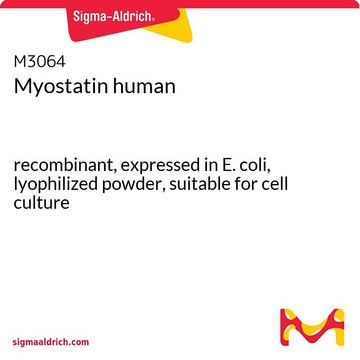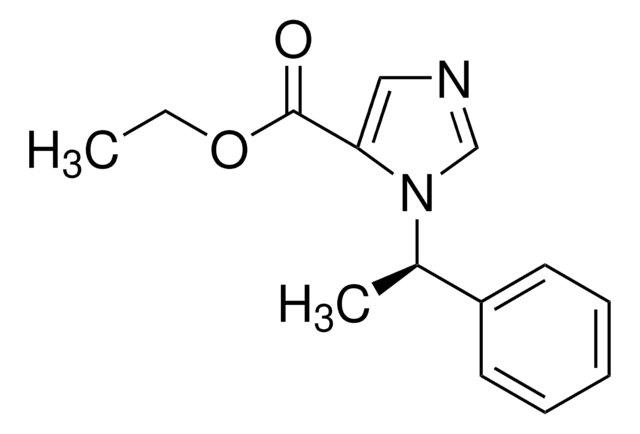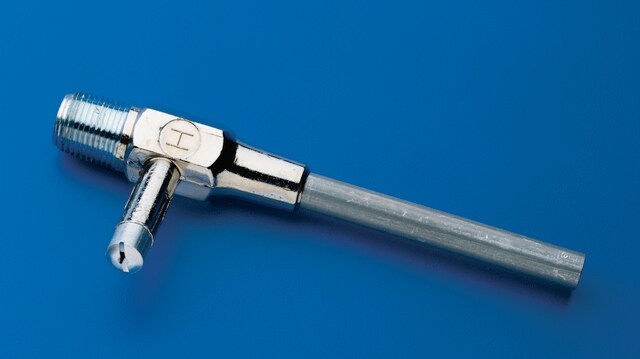SRP4623P
Myostatin Proform human
recombinant, expressed in E. coli, ≥98% (SDS-PAGE), ≥98% (HPLC)
Synonym(s):
GDF-8, Growth Differentiation Factor 8, MSTN, MSTN Muscle Hypertrophy
Sign Into View Organizational & Contract Pricing
All Photos(1)
About This Item
Recommended Products
biological source
human
recombinant
expressed in E. coli
Assay
≥98% (HPLC)
≥98% (SDS-PAGE)
form
lyophilized
mol wt
~27.8 kDa
packaging
pkg of 10 μg
impurities
endotoxin, tested
NCBI accession no.
shipped in
wet ice
storage temp.
−20°C
Gene Information
human ... MSTN(2660)
General description
MSTN (myostatin) belongs to the transforming growth factor-β (TGF β) superfamily containing numerable homologous cytokine proteins. This gene is expressed in skeletal muscle, and codes for a precursor protein composed of an N-terminal leader peptide, a pro-peptide domain, and a C-terminal domain. This precursor protein is proteolytically cleaved by bone morphogenetic protein 1 (BMP-1) at a conserved four amino acid RSRR site to produce the 13kDa mature protein.
Biochem/physiol Actions
MSTN (myostatin) functions as a negative modulator of muscle cell development. It functions through forming heteromeric receptor complexes such as with activin type II receptor B (ActRIIB), and with lesser affinity with ActIIA. This interaction results in the recruitment of type I receptors like activin receptor-like kinase 4 (ALK4) or ALK5, leading to the phosphorylation of Smad2 (small mothers against decapentaplegic) and Smad3, which move to the nucleus and suppress myogenesis. In MSTN-null mice, there is delayed skin wound healing due to the increased expression of decorin, an endogenous transforming growth factor-β (TGF β) suppressor. Topical treatment with TGF-β1 restored skin wound healing, suggesting that MSTN agonists might have therapeutic beneficial in skin wound repair.
Physical form
Lyophilized without any additives.
Reconstitution
Centrifuge the vial prior to opening. Avoid freeze-thaw cycles.
Reconstitute in water to a concentration of 0.1 to 1.0 mg/mL. This solution can then be diluted into other aqueous buffers.
Storage Class Code
11 - Combustible Solids
WGK
WGK 3
Flash Point(F)
Not applicable
Flash Point(C)
Not applicable
Certificates of Analysis (COA)
Search for Certificates of Analysis (COA) by entering the products Lot/Batch Number. Lot and Batch Numbers can be found on a product’s label following the words ‘Lot’ or ‘Batch’.
Already Own This Product?
Find documentation for the products that you have recently purchased in the Document Library.
Myostatin-null mice exhibit delayed skin wound healing through the blockade of transforming growth factor-? signaling by decorin.
Zhang C
American Journal of Physiology. Cell Physiology, 302, 1213-1225 (2012)
Myostatin rapid sequence evolution in ruminants predates domestication.
Tellgren A
Molecular Phylogenetics and Evolution, 33, 782-790 (2004)
Qiqi Yang et al.
Disease models & mechanisms, 12(2) (2019-02-06)
Cancer cachexia affects up to 80% of patients with advanced solid cancer and leads to excessive muscle wasting. Here, using an inducible zebrafish hepatocellular carcinoma (HCC) model driven by oncogenic krasG12V , we observed a progressive muscle-wasting phenotype in adult
Our team of scientists has experience in all areas of research including Life Science, Material Science, Chemical Synthesis, Chromatography, Analytical and many others.
Contact Technical Service







